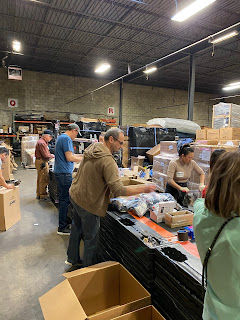Each semester, I read a book on evolution with the Evolution Round Table at Franklin and Marshall College in Lancaster, Pa. Until two years ago, the group met Mondays at noon in one of the college houses. Since March of 2020, like so much of the world, we meet on Zoom.
The group is mostly retired scientists, but there are also people like me who worked in science museums, libraries and even a few artists and business people. The group has existed since the 90s. Stephen Jay Gould once visited the campus for a talk and sat in with the group. Over the years we have read Gould, Richard Dawkins, Charles Darwin, and many of the luminaries of evolution. Most of the books focus on biology. Some, like Sapiens by Yuval Noah Harari, are sweeping histories.
The current book, A Brief History of Earth: Four Billion Years in Eight Chapters, is a sweeping history focused on geology. Andrew H. Knoll writes with the wit and brilliance his title promises. His outline is by subject, rather than chronology, but flows from the earth's beginnings to our current state.
The chapters:
- Chemical Earth
- Physical Earth
- Biological Earth
- Oxygen Earth
- Animal Earth
- Green Earth
- Catastrophic Earth
- Human Earth
Each chapter presents the development of earth in a different frame, but the narrative tracks the development of earth from the beginning to the present. Chemical earth explains some basic chemistry and how chemistry determined the history of the planet we live on. Knoll focuses on zircons and how they help to show the age of the earth and details of earth's history. Zircons bond with uranium which allows radiation dating. Knoll ends the chapter:
The remarkable drama of Earth's birth--accretion from ancient star stuff, global melting and differentiation that shaped our planet's interior, the formation of oceans and atmosphere--played out on a timescale of 100 million years or less. By 4.4 billion years ago, Earth had recognizably become a rocky planet bathed by water beneath a veneer of air. ... Earth was swaddled by a thick atmosphere, but it was air without oxygen; human time travelers wouldn't last long on primitive Earth. The world we know of large continents, breathable air--and life--was yet to come.
With each succeeding chapter, the story moves forward through the past four billion years in smaller increments until the final chapter, the brief period that the earth has been home to us humans.
In the chapter "Biological Earth" Knoll tells us how life developed with an emphasis on the oldest evidence of life. There are traces of single-cell organisms from more than three billion years ago. As I read of these shadows of life captured in rock, I thought of the many science deniers who are part of my life through family and the Army and other acquaintances.
Earlier this year, I spoke with a family member who believes God sprinkled dinosaur bones around to make the earth look older, but really, the earth is just six thousand years old. He knows no science, did not go to college, but believes he is smarter than every scientist since Isaac Newton. (Creationists like Newton.)
The Greeks said philosophy begins with θαυμαζειν, with Wonder. Until the 19th century, what we call science was called Natural Philosophy. Wonder is at the center of innovation in science. I wish I could feel the wonder Charles Darwin felt on Galapagos; the wonder I heard Richard Smalley describe when he said he could feel the 60-carbon atom Buckminsterfullene "snap" into spherical existence; the wonder Einstein must have felt when he knew he could prove Special Relativity.
There is no wonder in science denial, none of the speechless state in awe of the beauty and majesty and surprise of the reality of nature, from Quarks to Quasars.
Each year, I experience a little more of that wonder, reading books written by those who made the discoveries that more deeply and beautifully describe the depth and beauty of the natural world and cosmos.
But I am left to wonder how anyone could turn their back on the wonder of life as it is and trade it for the dull, gray certainty of untested belief.
First eleven books of 2022:
Prisoners of Geography by Tim Marshall
Understanding Beliefs by Nils Nilsson
1776 by David McCullough
The Life of the Mind by Hannah Arendt
Civilization: The West and the Rest by Niall Ferguson
How to Fight Anti-Semitism by Bari Weiss
Unflattening by Nick Sousanis
Marie Curie by Agnieszka Biskup (en francais)
The Next Civil War by Stephen Marche
Fritz Haber, Volume 1 by David Vandermeulen




























